2012年中考英语二轮复习课件教材突破篇(人教版)Period 15 【Units 9-10, Book 8B】
文档属性
| 名称 | 2012年中考英语二轮复习课件教材突破篇(人教版)Period 15 【Units 9-10, Book 8B】 | 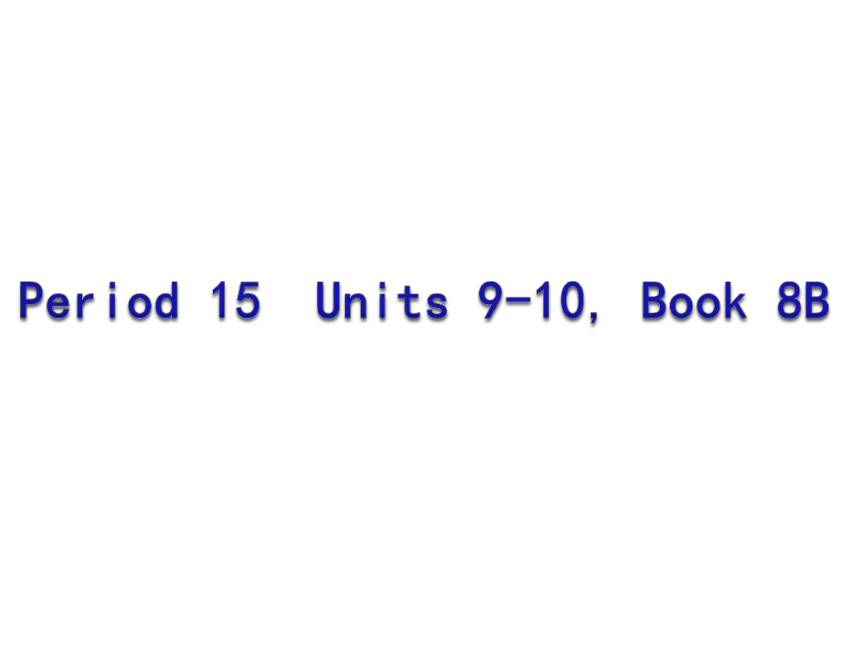 | |
| 格式 | zip | ||
| 文件大小 | 303.8KB | ||
| 资源类型 | 教案 | ||
| 版本资源 | 通用版 | ||
| 科目 | 英语 | ||
| 更新时间 | 2012-03-06 22:22:36 | ||
图片预览

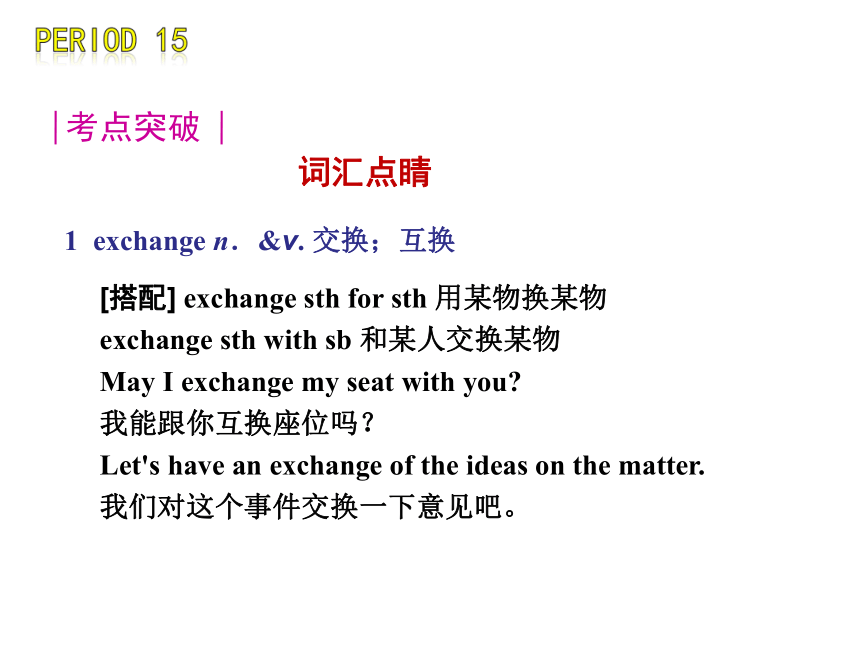
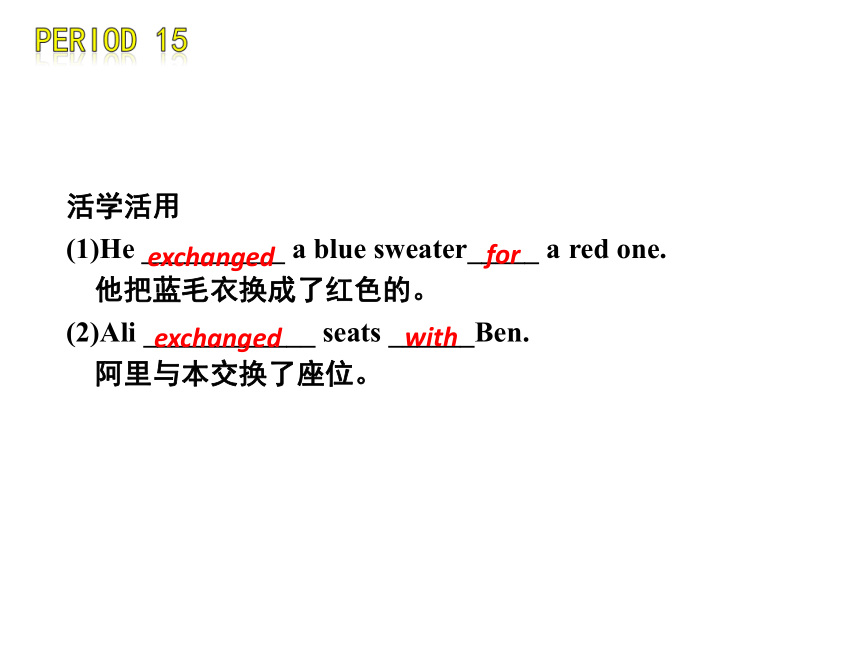
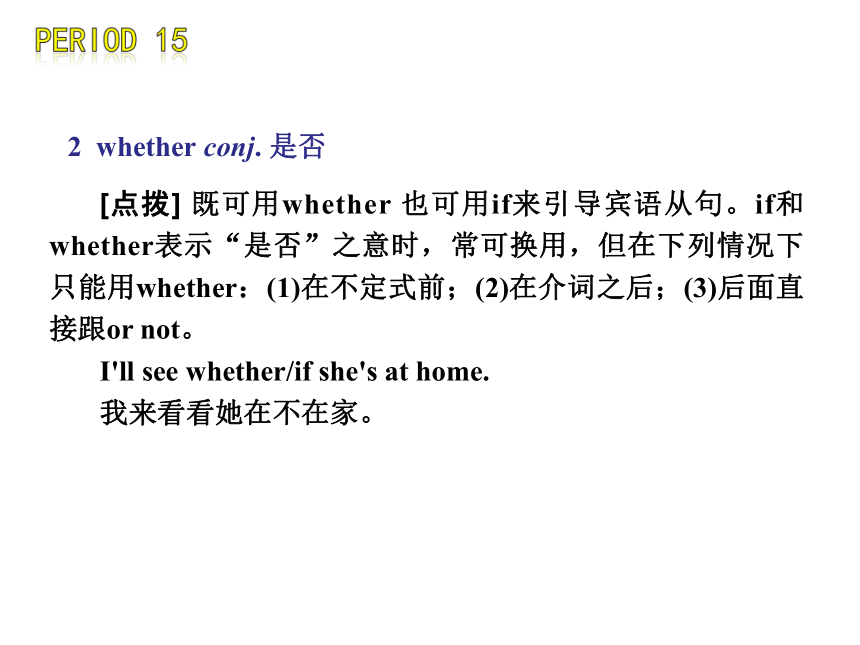
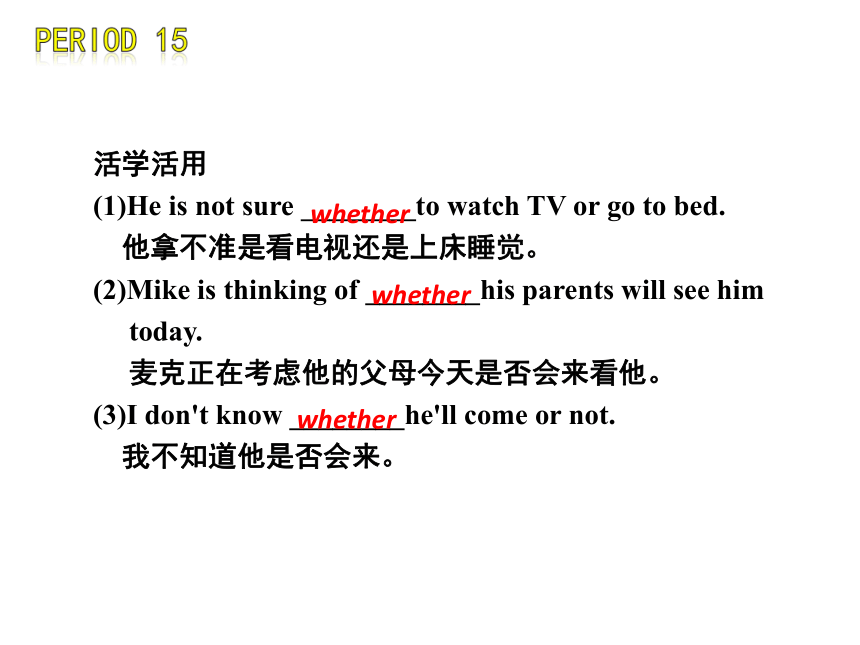
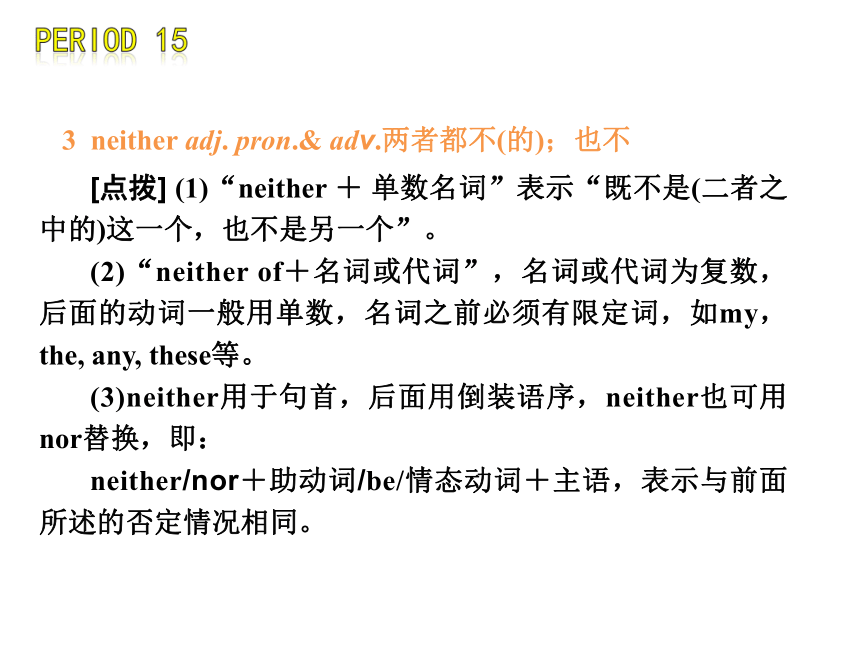
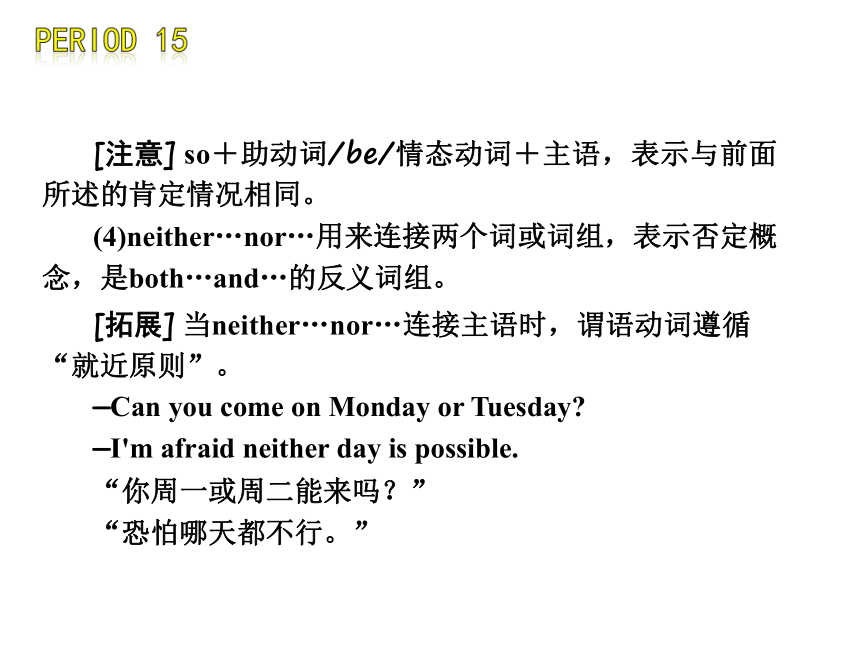
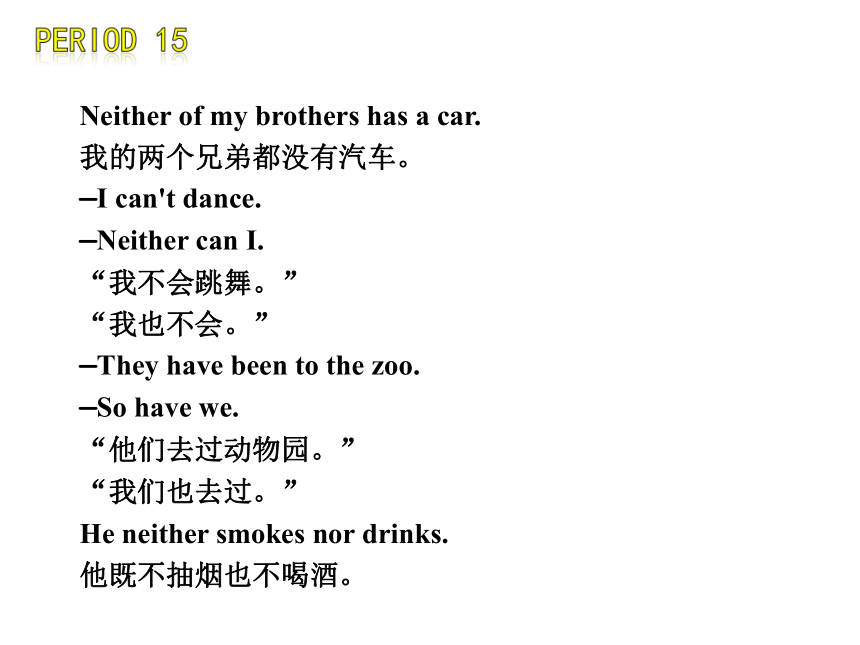
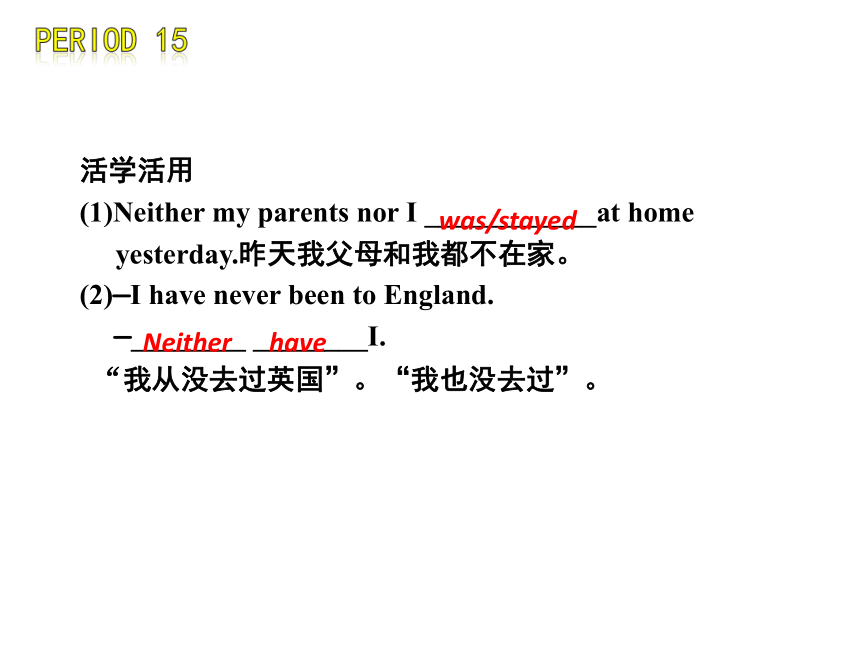
文档简介
(共27张PPT)
·吉林省专用
考点突破
·吉林省专用
词汇点睛
1 exchange n.&v. 交换;互换
[搭配] exchange sth for sth 用某物换某物
exchange sth with sb 和某人交换某物
May I exchange my seat with you
我能跟你互换座位吗?
Let's have an exchange of the ideas on the matter.
我们对这个事件交换一下意见吧。
·吉林省专用
活学活用
(1)He __________ a blue sweater_____ a red one.
他把蓝毛衣换成了红色的。
(2)Ali ____________ seats ______Ben.
阿里与本交换了座位。
exchanged
for
exchanged
with
·吉林省专用
2 whether conj. 是否
[点拨] 既可用whether 也可用if来引导宾语从句。if和whether表示“是否”之意时,常可换用,但在下列情况下只能用whether:(1)在不定式前;(2)在介词之后;(3)后面直接跟or not。
I'll see whether/if she's at home.
我来看看她在不在家。
·吉林省专用
活学活用
(1)He is not sure ________to watch TV or go to bed.
他拿不准是看电视还是上床睡觉。
(2)Mike is thinking of ________his parents will see him
today.
麦克正在考虑他的父母今天是否会来看他。
(3)I don't know ________he'll come or not.
我不知道他是否会来。
whether
whether
whether
·吉林省专用
3 neither adj. pron.& adv.两者都不(的);也不
[点拨] (1)“neither + 单数名词”表示“既不是(二者之中的)这一个,也不是另一个”。
(2)“neither of+名词或代词”,名词或代词为复数,后面的动词一般用单数,名词之前必须有限定词,如my,the, any, these等。
(3)neither用于句首,后面用倒装语序,neither也可用nor替换,即:
neither/nor+助动词/be/情态动词+主语,表示与前面所述的否定情况相同。
·吉林省专用
[注意] so+助动词/be/情态动词+主语,表示与前面所述的肯定情况相同。
(4)neither…nor…用来连接两个词或词组,表示否定概念,是both…and…的反义词组。
[拓展] 当neither…nor…连接主语时,谓语动词遵循“就近原则”。
—Can you come on Monday or Tuesday
—I'm afraid neither day is possible.
“你周一或周二能来吗?”
“恐怕哪天都不行。”
·吉林省专用
Neither of my brothers has a car.
我的两个兄弟都没有汽车。
—I can't dance.
—Neither can I.
“我不会跳舞。”
“我也不会。”
—They have been to the zoo.
—So have we.
“他们去过动物园。”
“我们也去过。”
He neither smokes nor drinks.
他既不抽烟也不喝酒。
·吉林省专用
活学活用
(1)Neither my parents nor I ____________at home
yesterday.昨天我父母和我都不在家。
(2)—I have never been to England.
—________ ________I.
“我从没去过英国”。“我也没去过”。
was/stayed
Neither
have
·吉林省专用
4 least adj.最少的
[点拨] (1)least是little的最高级形式,其相对的词是most。the least作为限定词用在不可数名词之前表示数量。
(2)at least(至少)相对的词组是at most。
She does the least work in this factory.
她在这个厂子干最少的活。
She may be slow but at least she is honest.
她也许有些迟钝,但至少她诚实。
·吉林省专用
5 population n.人口
[点拨] 指人口“多”时用large/big,“少”时用small;表示某国、某地有多少人口时,一般说the population of…is…或…has a population of…;提问“有多少人口”用what或how large,不用how many或how much。
The population of this city is getting larger and larger, but the population of my village is getting smaller and smaller.My village has a population of 200.这个城市的人口数量越来越多,但我们村的人口数量越来越少。我们村有两百人。
What is the population of Canada
加拿大的人口是多少?
·吉林省专用
6 wake v.醒来;唤醒
[点拨] wake up意为“睡醒,醒来,唤醒”。
wake up 后的宾语是代词时,必须放在wake和up中间。
She usually wakes (up) at six in the morning.
她通常早上六点醒来。
Don't wake him up. He's too tired.
别吵醒他,他太累了。
[拓展] awake作形容词,意为“醒着的”,常放在系动词后,用作表语,其反义词为asleep。
Don't make so much noise. The tiger will probably be awake.别这么吵,老虎可能会醒来。
·吉林省专用
7 note n.笔记;短信;便条 v.注意;观察
[搭配] take/make notes of 记录;做……的笔记
take note of 注意到;将……铭记在心
notes to the text 课文注释
Please take notes of the lecture.
请做讲座笔记。
I'll have to leave a note for Mary.
我得为玛丽留张便条。
Note my new name and how to spell it.
记下我的新名字及它的拼法。
·吉林省专用
句型透视
1 Have you ever been to Disneyland
你曾经去过迪斯尼乐园吗?
[点拨] (1)have/has been to意思是“到过,去过”,表示曾经到过某地,而此时人已不在那儿了。
(2)have/has gone to意思是“去了某地”,现在人可能在去的途中或已在那个地方了,而不在说话者处。
(3)have/has been in/at意思是“曾经待在某地”,常和持续性的时间状语连用。
Have you ever been to Hong Kong
你曾经去过香港吗?
Where is Lily Has she gone to the library
莉莉在哪儿?她去图书馆了吗?
·吉林省专用
I have been in Harbin for three years.
我已经在哈尔滨待了三年了。
活学活用
( )(1)[2010·自贡] —Where are the Greens,
may I ask
—Well, they ________ England. They have been
there for nearly a week now.
A.have been to
B.are going to
C.have gone to
C
·吉林省专用
( )(2)Tom ________ the USA. He ________ back
in two months.
A.has gone to; comes
B.has gone to; will be
C.has been to; comes
D.has been to; will be
B
·吉林省专用
2 This is great weather,isn't it
今天是个好天气,不是吗?
[点拨] 这是一个反意疑问句,由前后两部分构成,其结构为:“肯定陈述句+简略否定问句”或“否定陈述句+简略肯定问句”。若陈述句中含有hardly,never,few,little,nothing,nobody等否定意义的词时,简略问句要用肯定式。
Tom gets up very early every day,doesn't he
汤姆每天起床很早,是不是?
They didn't go for a walk,did they
他们没去散步,对吗?
There are few people in the shop,are there
这家商店几乎没人,是吗?
·吉林省专用
活学活用
完成下列反意疑问句
(1)The girl speaks English well,________ ______?
(2)Linda can drive a car,________ ______?
(3)They are never late for school,______ ______?
(4)There is little food in the fridge,____ _______?
doesn't
she
can't
she
are
they
is
there
·吉林省专用
高频考点
( )1.—Have you ________the film yet
—Yes,I ________it last Sunday.
A.saw; saw B.saw; seen
C.seen; saw D.seen; see
( )2.[2011·福州] —Li Mei usually helps others,
________?
—Yes,she is kind hearted.
A.does she B.is she
C.doesn't she
( )3.My parents enjoy traveling. They ________many
interesting places.
A.have gone to B.have been to
C.have been in D.have gone out
C
C
B
基础过关
·吉林省专用
词汇专练
Ⅰ. 根据句意及首字母提示完成单词
1. Mike is very b_____ and he isn't afraid of tigers.
2. The t___________ of tomorrow will be above 10℃.
3. Don't f____. We will be safe.
4. I arrived at school at a q______ past seven today.
rave
emperature
ear
uarter
·吉林省专用
5. —Oh, Sonia, you are late again.
—I'm sorry, but the t_____ is really busy this
morning.
6. I forgot to say g_______ when I left.
7. I think you should write a thank you n____ to the boy.
8. The b____ is only six months old. He's very lovely,
isn't he
raffic
oodbye
ote
aby
·吉林省专用
Ⅱ. 从方框内选词,并用其适当形式填空
1. Three _________ of the students are girls.
2. Her new job is looking after ________.
3. We should protect our ________ environment.
4. When he ______ up, he found nobody was in the room.
5. He has to walk ________ because of his sore legs.
quarters
babies
natural
woke
slowly
·吉林省专用
Ⅲ. 用所给词的适当形式填空
He____ ever______ (be) to the History Museum several times.
2. Let's go to a _______(sand) beach to take photos.
3. The best way________ (work) out the problem is to
ask the teacher for help.
4. Noise is very unpleasant,____________(especial) when
you're trying to sleep.
5. There are two people ________(wait) in line to buy ice
cream in the picture.
6. There are two ______ (fox) in the picture.
has
been
to work
sandy
especially
waiting
foxes
·吉林省专用
Ⅰ. 根据汉语意思完成下列句子,每空一词
1. 昨天我们的英语课以一首歌结束。
Our English class______ ___ with a song yesterday.
2. 这座山终年覆盖着厚厚的雪。
The mountain is covered with thick snow___ _____
______.
3. 无论是夏天还是冬天,海南岛是放松自己的最好地方。
________ it is in summer___ in winter,Hainan Island is
the best place to relax yourself.
4. 他们来加拿大已经有五年了。
They have______ ___ Canada for five years.
句型专练
ended
up
year
or
all
round
Whether
been
in
·吉林省专用
5. 每支队至少应该募捐6,000港币。
Each team should raise___ ______6,000 HK dollars.
6. 昨天小李和我们一起来的。
Xiao Li______ ______ _____ us yesterday.
7. 另一方面,我们都不了解这座城市。
___ ____ ______ _____, we don't know this city well.
8. 昨天下午四点,我们正在书店浏览图书。
We______ ________ ________ books in the
bookstore at four yesterday afternoon.
at
least
along
the
came
with
On
other
hand
were
looking
through
·吉林省专用
Ⅱ. 句型转换
1. Both of us have been to the amusement park.(改为否定句)
_______ ___us ____ been to the amusement park.
2. I have learned English for nearly thirty years.(对画线部分
提问)
_____ _____ _____ you learned English
3. The population of China is over 1.3 billion.(对画线部分提问)
______ ___ the population of China
4. I get along well with my classmates.(对画线部分提问)
_____ ___ you get along with your classmates
Neither
of
has
How
long
have
What
is
do
How
·吉林省专用
awake与wake
awake和wake 都与“醒来”有关,但词性和用法有所不同。
(1)awake 是形容词,意为“醒着的”,通常用在系动词be 的后面作表语,但不能用作定语。
(2)wake意为“醒来”。wake up 意为“使……醒来、叫醒”,后接代词作宾语,这个代词要放在wake up 的中间。如果宾语是名词,则这个名词放在up的前面或后面都可以。
每日一辨
·吉林省专用
考点突破
·吉林省专用
词汇点睛
1 exchange n.&v. 交换;互换
[搭配] exchange sth for sth 用某物换某物
exchange sth with sb 和某人交换某物
May I exchange my seat with you
我能跟你互换座位吗?
Let's have an exchange of the ideas on the matter.
我们对这个事件交换一下意见吧。
·吉林省专用
活学活用
(1)He __________ a blue sweater_____ a red one.
他把蓝毛衣换成了红色的。
(2)Ali ____________ seats ______Ben.
阿里与本交换了座位。
exchanged
for
exchanged
with
·吉林省专用
2 whether conj. 是否
[点拨] 既可用whether 也可用if来引导宾语从句。if和whether表示“是否”之意时,常可换用,但在下列情况下只能用whether:(1)在不定式前;(2)在介词之后;(3)后面直接跟or not。
I'll see whether/if she's at home.
我来看看她在不在家。
·吉林省专用
活学活用
(1)He is not sure ________to watch TV or go to bed.
他拿不准是看电视还是上床睡觉。
(2)Mike is thinking of ________his parents will see him
today.
麦克正在考虑他的父母今天是否会来看他。
(3)I don't know ________he'll come or not.
我不知道他是否会来。
whether
whether
whether
·吉林省专用
3 neither adj. pron.& adv.两者都不(的);也不
[点拨] (1)“neither + 单数名词”表示“既不是(二者之中的)这一个,也不是另一个”。
(2)“neither of+名词或代词”,名词或代词为复数,后面的动词一般用单数,名词之前必须有限定词,如my,the, any, these等。
(3)neither用于句首,后面用倒装语序,neither也可用nor替换,即:
neither/nor+助动词/be/情态动词+主语,表示与前面所述的否定情况相同。
·吉林省专用
[注意] so+助动词/be/情态动词+主语,表示与前面所述的肯定情况相同。
(4)neither…nor…用来连接两个词或词组,表示否定概念,是both…and…的反义词组。
[拓展] 当neither…nor…连接主语时,谓语动词遵循“就近原则”。
—Can you come on Monday or Tuesday
—I'm afraid neither day is possible.
“你周一或周二能来吗?”
“恐怕哪天都不行。”
·吉林省专用
Neither of my brothers has a car.
我的两个兄弟都没有汽车。
—I can't dance.
—Neither can I.
“我不会跳舞。”
“我也不会。”
—They have been to the zoo.
—So have we.
“他们去过动物园。”
“我们也去过。”
He neither smokes nor drinks.
他既不抽烟也不喝酒。
·吉林省专用
活学活用
(1)Neither my parents nor I ____________at home
yesterday.昨天我父母和我都不在家。
(2)—I have never been to England.
—________ ________I.
“我从没去过英国”。“我也没去过”。
was/stayed
Neither
have
·吉林省专用
4 least adj.最少的
[点拨] (1)least是little的最高级形式,其相对的词是most。the least作为限定词用在不可数名词之前表示数量。
(2)at least(至少)相对的词组是at most。
She does the least work in this factory.
她在这个厂子干最少的活。
She may be slow but at least she is honest.
她也许有些迟钝,但至少她诚实。
·吉林省专用
5 population n.人口
[点拨] 指人口“多”时用large/big,“少”时用small;表示某国、某地有多少人口时,一般说the population of…is…或…has a population of…;提问“有多少人口”用what或how large,不用how many或how much。
The population of this city is getting larger and larger, but the population of my village is getting smaller and smaller.My village has a population of 200.这个城市的人口数量越来越多,但我们村的人口数量越来越少。我们村有两百人。
What is the population of Canada
加拿大的人口是多少?
·吉林省专用
6 wake v.醒来;唤醒
[点拨] wake up意为“睡醒,醒来,唤醒”。
wake up 后的宾语是代词时,必须放在wake和up中间。
She usually wakes (up) at six in the morning.
她通常早上六点醒来。
Don't wake him up. He's too tired.
别吵醒他,他太累了。
[拓展] awake作形容词,意为“醒着的”,常放在系动词后,用作表语,其反义词为asleep。
Don't make so much noise. The tiger will probably be awake.别这么吵,老虎可能会醒来。
·吉林省专用
7 note n.笔记;短信;便条 v.注意;观察
[搭配] take/make notes of 记录;做……的笔记
take note of 注意到;将……铭记在心
notes to the text 课文注释
Please take notes of the lecture.
请做讲座笔记。
I'll have to leave a note for Mary.
我得为玛丽留张便条。
Note my new name and how to spell it.
记下我的新名字及它的拼法。
·吉林省专用
句型透视
1 Have you ever been to Disneyland
你曾经去过迪斯尼乐园吗?
[点拨] (1)have/has been to意思是“到过,去过”,表示曾经到过某地,而此时人已不在那儿了。
(2)have/has gone to意思是“去了某地”,现在人可能在去的途中或已在那个地方了,而不在说话者处。
(3)have/has been in/at意思是“曾经待在某地”,常和持续性的时间状语连用。
Have you ever been to Hong Kong
你曾经去过香港吗?
Where is Lily Has she gone to the library
莉莉在哪儿?她去图书馆了吗?
·吉林省专用
I have been in Harbin for three years.
我已经在哈尔滨待了三年了。
活学活用
( )(1)[2010·自贡] —Where are the Greens,
may I ask
—Well, they ________ England. They have been
there for nearly a week now.
A.have been to
B.are going to
C.have gone to
C
·吉林省专用
( )(2)Tom ________ the USA. He ________ back
in two months.
A.has gone to; comes
B.has gone to; will be
C.has been to; comes
D.has been to; will be
B
·吉林省专用
2 This is great weather,isn't it
今天是个好天气,不是吗?
[点拨] 这是一个反意疑问句,由前后两部分构成,其结构为:“肯定陈述句+简略否定问句”或“否定陈述句+简略肯定问句”。若陈述句中含有hardly,never,few,little,nothing,nobody等否定意义的词时,简略问句要用肯定式。
Tom gets up very early every day,doesn't he
汤姆每天起床很早,是不是?
They didn't go for a walk,did they
他们没去散步,对吗?
There are few people in the shop,are there
这家商店几乎没人,是吗?
·吉林省专用
活学活用
完成下列反意疑问句
(1)The girl speaks English well,________ ______?
(2)Linda can drive a car,________ ______?
(3)They are never late for school,______ ______?
(4)There is little food in the fridge,____ _______?
doesn't
she
can't
she
are
they
is
there
·吉林省专用
高频考点
( )1.—Have you ________the film yet
—Yes,I ________it last Sunday.
A.saw; saw B.saw; seen
C.seen; saw D.seen; see
( )2.[2011·福州] —Li Mei usually helps others,
________?
—Yes,she is kind hearted.
A.does she B.is she
C.doesn't she
( )3.My parents enjoy traveling. They ________many
interesting places.
A.have gone to B.have been to
C.have been in D.have gone out
C
C
B
基础过关
·吉林省专用
词汇专练
Ⅰ. 根据句意及首字母提示完成单词
1. Mike is very b_____ and he isn't afraid of tigers.
2. The t___________ of tomorrow will be above 10℃.
3. Don't f____. We will be safe.
4. I arrived at school at a q______ past seven today.
rave
emperature
ear
uarter
·吉林省专用
5. —Oh, Sonia, you are late again.
—I'm sorry, but the t_____ is really busy this
morning.
6. I forgot to say g_______ when I left.
7. I think you should write a thank you n____ to the boy.
8. The b____ is only six months old. He's very lovely,
isn't he
raffic
oodbye
ote
aby
·吉林省专用
Ⅱ. 从方框内选词,并用其适当形式填空
1. Three _________ of the students are girls.
2. Her new job is looking after ________.
3. We should protect our ________ environment.
4. When he ______ up, he found nobody was in the room.
5. He has to walk ________ because of his sore legs.
quarters
babies
natural
woke
slowly
·吉林省专用
Ⅲ. 用所给词的适当形式填空
He____ ever______ (be) to the History Museum several times.
2. Let's go to a _______(sand) beach to take photos.
3. The best way________ (work) out the problem is to
ask the teacher for help.
4. Noise is very unpleasant,____________(especial) when
you're trying to sleep.
5. There are two people ________(wait) in line to buy ice
cream in the picture.
6. There are two ______ (fox) in the picture.
has
been
to work
sandy
especially
waiting
foxes
·吉林省专用
Ⅰ. 根据汉语意思完成下列句子,每空一词
1. 昨天我们的英语课以一首歌结束。
Our English class______ ___ with a song yesterday.
2. 这座山终年覆盖着厚厚的雪。
The mountain is covered with thick snow___ _____
______.
3. 无论是夏天还是冬天,海南岛是放松自己的最好地方。
________ it is in summer___ in winter,Hainan Island is
the best place to relax yourself.
4. 他们来加拿大已经有五年了。
They have______ ___ Canada for five years.
句型专练
ended
up
year
or
all
round
Whether
been
in
·吉林省专用
5. 每支队至少应该募捐6,000港币。
Each team should raise___ ______6,000 HK dollars.
6. 昨天小李和我们一起来的。
Xiao Li______ ______ _____ us yesterday.
7. 另一方面,我们都不了解这座城市。
___ ____ ______ _____, we don't know this city well.
8. 昨天下午四点,我们正在书店浏览图书。
We______ ________ ________ books in the
bookstore at four yesterday afternoon.
at
least
along
the
came
with
On
other
hand
were
looking
through
·吉林省专用
Ⅱ. 句型转换
1. Both of us have been to the amusement park.(改为否定句)
_______ ___us ____ been to the amusement park.
2. I have learned English for nearly thirty years.(对画线部分
提问)
_____ _____ _____ you learned English
3. The population of China is over 1.3 billion.(对画线部分提问)
______ ___ the population of China
4. I get along well with my classmates.(对画线部分提问)
_____ ___ you get along with your classmates
Neither
of
has
How
long
have
What
is
do
How
·吉林省专用
awake与wake
awake和wake 都与“醒来”有关,但词性和用法有所不同。
(1)awake 是形容词,意为“醒着的”,通常用在系动词be 的后面作表语,但不能用作定语。
(2)wake意为“醒来”。wake up 意为“使……醒来、叫醒”,后接代词作宾语,这个代词要放在wake up 的中间。如果宾语是名词,则这个名词放在up的前面或后面都可以。
每日一辨
